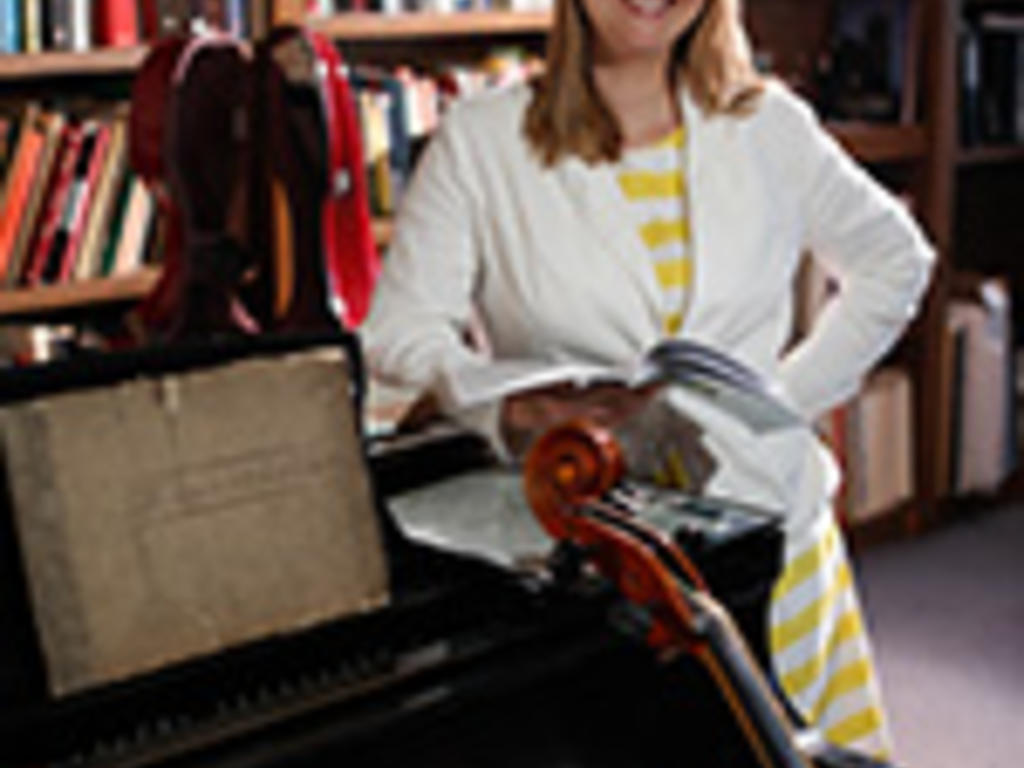By Richard J. Alley
Hassell Hall on Rhodes campus typically echoes with the sounds of music. Within those same walls, Assistant Professor Vanessa Rogers draws not from voices or instruments, but from text documents, to ensure that a two-century period of musical history does not disappear in silence.
Dr. Rogers first became interested in music history as an undergraduate when texts were placed in her hands. “When I was a senior, I took a small seminar on research methods in music. I ended up getting interested in theatrical music of the eighteenth century just because there were a few primary sources in the library from that century and the professor brought them into the class,” she says. “I used the papers from that class as my writing samples for grad school, and it started me on my way to becoming a specialist in eighteenth-century stage music.”
It was that hands-on experience with the past that led her to a master’s and PhD in historical musicology at the University of Southern California. Rogers, now in her fourth year with Rhodes, teaches music history-related courses such as Music and Drama in 18th-Century England, Women in Music, European Musical History, and Senior Seminar.
Rogers has worked extensively to preserve the history of musical theater in England, having taken several Rhodes students to London in the past for the Oxford-Rhodes London Stage Fellowship. This summer, she worked as a visiting research fellow at the University of London’s Institute for Musical Research. She currently works as a research associate for the London Stage, 1800-1900 database (which is hosted by Oxford Digital Libraries), as well as principal researcher for Ballad Operas Online: An Electronic Catalogue at the University of Oxford. Researchers at New College in Oxford have been collaborating with students at Rhodes and Princeton to digitize theatrical information from daily London newspapers from 1800 to 1900.
Meredith Broadway ’14 has been working with Rogers on her research. “It was interesting to be able to work with primary sources—these eighteenth-century and nineteenth-century documents,” she says. Though Rogers was not Broadway’s academic advisor, she became a mentor when Broadway, a history major, took Rogers’ Music and Drama in 18th-Century England class and, subsequently, began serving as Rogers’ research assistant in her sophomore year. Additionally, Broadway became a fellow through the Oxford-Rhodes London Stage Fellowship. Joining her in that effort, and continuing into next year, are Courtney Ashley ’15 and Tea Rose Pankey ’15.
“We look at digital images of original newspapers from the nineteenth century,” Rogers says. “We take all of the information out of the theatrical advertisements. The newspapers have very detailed advertisements because it was the primary way for people to know what was happening on any given night.”
The students extract the information and tag it, learning XML editing software along the way. Broadway and her co-fellows had to learn to code and index over the Internet with Rogers’ colleagues from Oxford, collaborating via Skype and through digital files and presentations sent through e-mail. “Using Skype, we could learn visually as well as hear the instructions, so it was very helpful to have that combination,” Broadway says.
“My counterparts in Oxford are really happy to have Rhodes helping with the database,” Rogers says. “They’re always so surprised that the Rhodes students are undergraduates because they have a lot of knowledge and they’re really quick to pick things up. They seem a little bit older than they are, probably because they’re high-achieving, academically minded students.”
Broadway’s interest at Rhodes was in history itself, yet the skills she obtained working on the musical theater fellowship, and with Rogers directly, have set her on the course to go to graduate school in library and information science at the University of Illinois at Urbana-Champaign, which has one of the nation’s highest-rated programs in digital archival studies.
“It was very meaningful. Dr. Rogers helped me a lot, not only with my academics with regard to the fellowship, but with regard to my personal career goal,” Broadway says. “She’s the one who very much encouraged me to go to grad school, particularly in library science, because she saw how much archiving, and particularly digital archiving, meant to me and how much I really enjoyed doing my work. And once you enjoy work, it’s not so much work, is it? You just enjoy doing it.”
